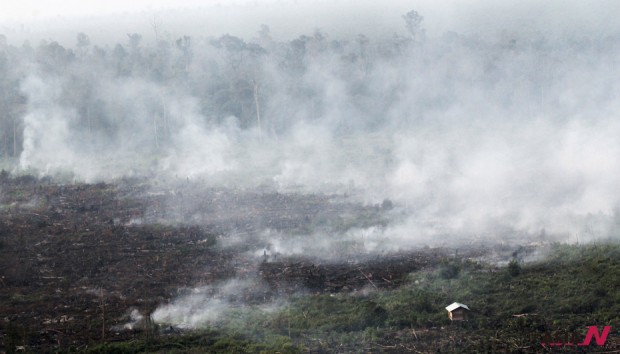[Asia Round-up] Haze pollution – punish the criminals
Editor’s note: Followings are summaries of editorials from major Asian media on current issues.
Haze – punish the criminals
[Brunei, The Brunei Times, 25-06-2013]
Haze blowing onto Malaysia and Singapore from fires in Indonesia brings air population to life-threatening levels in some areas. Most of Indonesia is not affected by the fires and sometimes some of this smoke blows into the north of Borneo including Brunei. These fires and the pollutants they send have become an annual affair, and are no light matter especially for those with respiratory ailments.
In 1997-98, the haze pollution was so severe that the ASEAN Transboundary Haze Pollution Agreement of 2002 was formed. All ASEAN countries have ratified it, except Indonesia.
Even though most of these fires are of natural origin, there are cases of deliberate burning of plantations to clear the land for cultivation, especially of palm oil. Only the Indonesian government can take measures to punish illegal burning. More than half of the plantations are owned by foreigners, mainly Malaysians and Singaporeans. Despite their origin, these criminals should be accountable for affecting the lives of millions of people.
Sexual predators in Philippine embassies
[Philippines, Philippine Daily Inquirer, 24-06-2013]
News that Filipino workers in the Middle East have been sexually exploited by officials at the Philippine embassies has reached home in the Philippines. Walden Bello, the Akbayan party-list representative, who broke the news about this outrageous phenomenon, stated, “Sexual abuse on our womenfolk perpetrated by their hosts in a foreign country is an awful crime. And it is triply terrible when they are exploited sexually by government officials who are supposed to protect them.”
Bello has accused two labor officials attached to embassies of Jordan and Kuwait of running prostitution rings and another official from the Department of Foreign Affairs (DFA) assigned in Syria of sexually harassing a distressed worker. Bello has not met any of the victims, but got his information from sources within the DFA and Department of Labour and Employment (DOLE).
Filipino workers are driven out of need to go work in foreign lands in extreme climates and unfriendly atmospheres. Some of these workers are even pushed to take shelter at embassies and consulates due to abusive employers. Embassy officials of these foreign lands prey on these powerless and penniless women.
It is important to quickly find out the truth and condemn this horrifying behavior not only because the two departments are in a state of turmoil, but because the nation, which heavily relies on remittances from overseas workers is demoralized. Until now, 11 ambassadors from the Middle East have been summoned back to the Philippines to take part in an inquiry. The government is encouraging victims to speak up and file complaints.
The obscene task of determining ‘moral’ laws is no walk in the park
[Taiwan, The China Post, 25-06-2013]
Taichung police last week revealed that two foreign students from US and Brazil studying Mandarin in Taiwan were arrested for having sex in a public park. They were arrested for indecent public behaviour and may face charges of offences against morality. However, the definition of “indecent public behaviour” is not clear in the Criminal Code of the Republic of China.
According to the Article 234 under the Offence Against Morality statute, a person who for purposes of exhibition publicly commits an obscene act shall be sentenced to imprisonment for less than one year. In this article, further explanation about “obscene act” is not given. It means it all depends on the police’s judgment or definition to determine what an “obscene act” is.
It is extremely important to have a clear definition as to what “obscene” acts may not be performed in public. Some may argue that a law may not be possible to regulate what people can or cannot do in public spaces based on the concept of human rights. However, people also have the right to not be exposed to behaviours that will cause them distress.
Another reason is that the police in Taiwan can have a definite and firm standard by which to enforce the law. Police must be able to refer to specific articles with clear definitions of offences so that justice can be properly served and the police can carry out their duties while ensuring a fair investigation will be conducted.
The legacy continues even as a new era begins in Qatar
[Qatar, Gulf Times, 25-06-2013]
Qatar continued its trailblazing policies with the Emir Sheikh Hamad bin Khalifa al-Thani announcing a smooth transition of power to the Heir Apparent Sheikh Tamim bin Hamad al-Thani. The most important task ahead of Sheikh Tamim will be to continue the strong legacy of his father and all the signs show that he understands that.
Under Sheikh Hamad’s leadership, Qatar has emerged as a regional diplomatic power. Under his leadership, the state mediated conflicts in Darfur, Somalia and Lebanon and strived tirelessly in improving inter-Palestinian dialogue. Also, Doha hosted a meeting of the Friends of Syria group last week, Al Jazeera television network was launched and Qatar won the 2022 FIFA World Cup bid.
The handover is unlikely to result in a major change of direction for the country’s fast-growing economy or foreign policy. Since his appointment as heir apparent a decade ago, Sheikh Tamim has held top security and economic posts, as well as overseen Qatar’s ambitious plans to use sports to raise its international profile. Sheikh Tamim has the same futuristic outlook as Sheikh Hamad and will follow in his footsteps. The nation is in safe hands.






